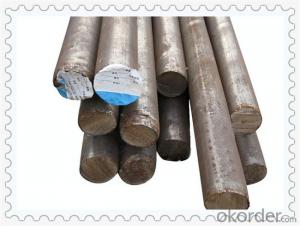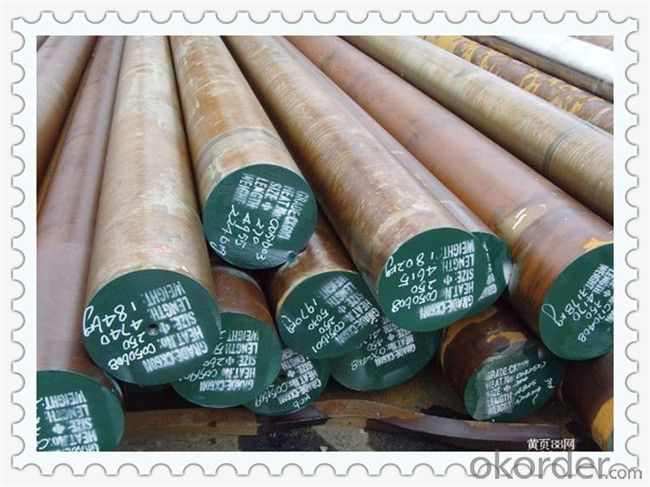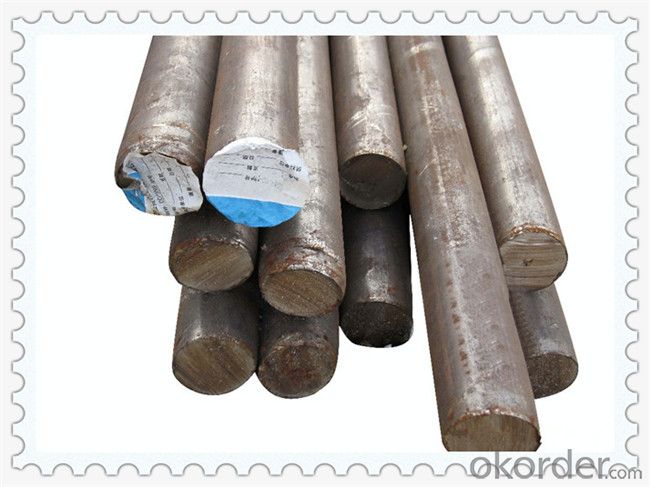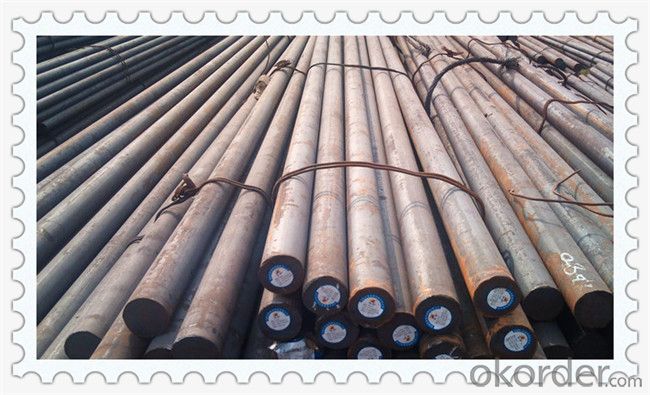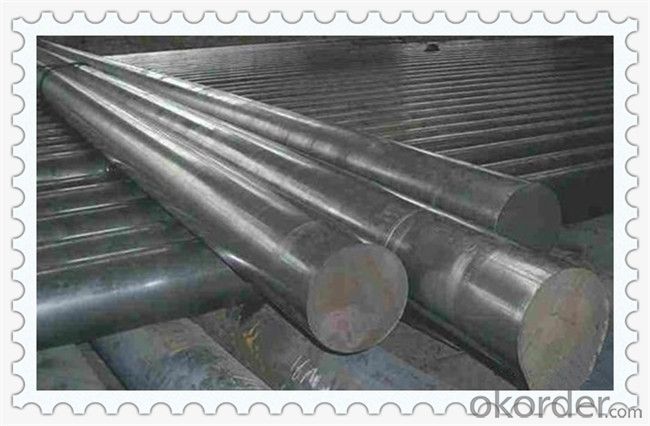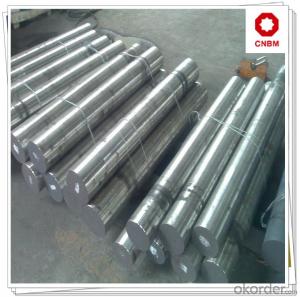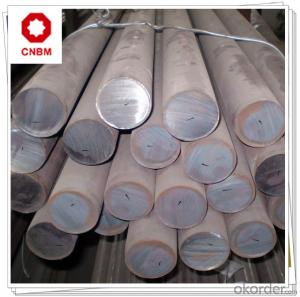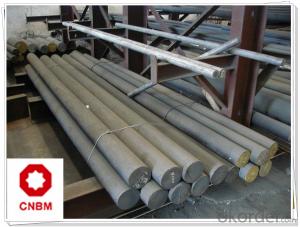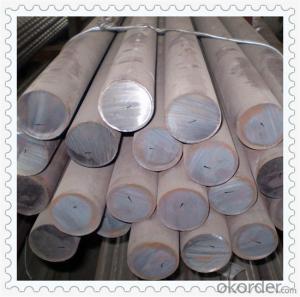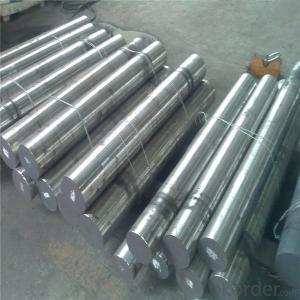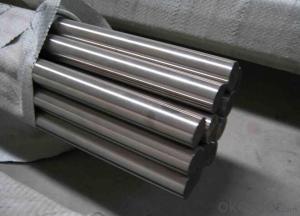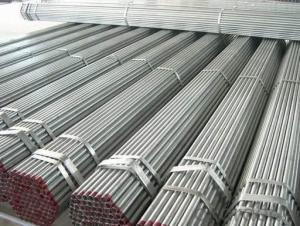35cd4 Alloy Structural Steel Round Bars
- Loading Port:
- China main port
- Payment Terms:
- TT OR LC
- Min Order Qty:
- 50 m.t.
- Supply Capability:
- 10000 m.t./month
OKorder Service Pledge
OKorder Financial Service
You Might Also Like
35cd4 Alloy Structural Steel Round Bars
Product Details
1. Sizes information
Diameter:10-310mm
Length:canbe required to any sizes. (Commenly from 4m-6m)
Length tolerange:+/-100mm(max)
Straightness:3mm/m(max)
2. Advantage of 35crmo steel
35CrMo alloy steel, a high static strength, impact toughness and high fatigue limit.
35CrMo has better Hardenability than 40Cr,and has high strength and high creep rupture strength under high temperature, long-term working temperature up to 500 °C
3. Mechanical Properties
| Grade | Tensile Strength (Mpa) | Yield Strength (Mpa) | Elongation (%) | Reduction of Area (%) | Charpy Impact (J) | Hardness (HB) |
| 35cd4 | ≥985 | ≥835 | ≥12 | ≥45 | ≥63 | 229 |
4. Chemical composition
| Grade | C | Cr | Mo | Si | Mn | P | S | Ni | Cu |
| 35cd4 | 0.32-0.40 | 0.80-1.10 | 0.15-0.25 | 0.17-0.37 | 0.40-0.70 | ≤0.035 | ≤0.035 | ≤0.30 | ≤0.30 |
5. Other Grades
Carbon Steel Round Bar | SS400, S235JR,Q235, ASTM A36, Fe360A, Fe360B,SM400A,080A15, SS41,E235B |
SAE 1020, AISI 1020, ASTM 1020, S20C, 20#, 050A20 | |
SAE 1045, AISI 1045, ASTM 1045, S45C, 45#,EN8, XC45, XC48, 45B, C45, CK45, CM45, 060A47, R683/IC45e | |
Alloy Steel Round Bar | 40Cr, DIN 1.7035, SAE 5140, AISI 5140, ASTM 5140, SCr440, 41Cr4, 530A40, 42Cr4, 40X, R683/VII3 |
SAE4140,42CrMo, 42CrMo4, DIN 1.7225, SCM440,EN19, 42CD4, 708M40, R683/II3 | |
SAE 4340, 40CrNiMoA, EN24, SNCM439, 817M40,40XMA, R683/III4 | |
SAE 8620,,AISI 8620, ASTM 8620, 20CrNiMo,SNCM220, 805M20 | |
SAE52100, AISI52100,ASTM E52100, GCr15, SUJ2, 100C6, 100Cr6, 1.3505, 534A99, IIIX15 |
Products Show
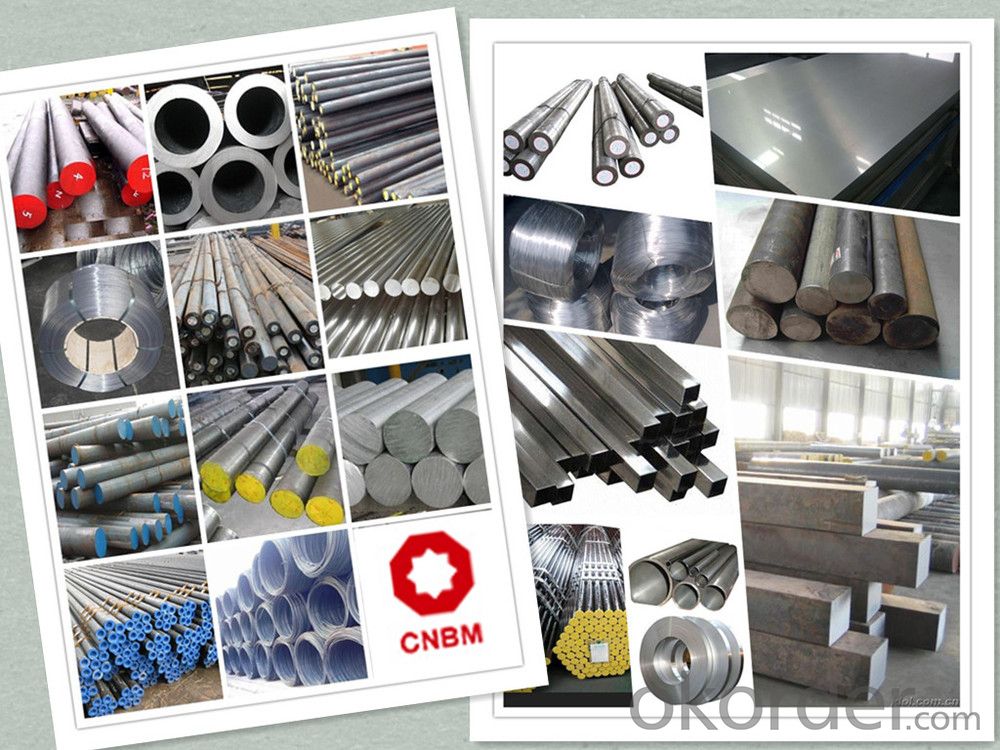
Product Overviews
| Product Name | Typical Grades | Diameter(mm) | Standard adopted |
| Carbon Steel | 20 (1020/S20C/C22) | Ø16-Ø300 |
GB/SAE/JIS/DIN
|
| 40 (1040/S40C/C40) | |||
| 45 (1045/S45C/C45) | |||
| Bearing Steel | GCr9 (51100/SUJ1) | Ø12-Ø250 | |
| GCr15 (52100/SUJ2/100Gr6) | |||
| GCr9SiMn (A485-Gr.1/SUJ3) | |||
Cr-Mo Steel | 20Cr (5120/SCr420H/20Cr4) | Ø12-Ø250 | |
| 40Cr (5140/SCr440/41Cr4) | |||
| 42CrMo(4140/SCM440/42CrMo4) | |||
| Gear Steel | 20CrNiMo | Ø16-Ø600 | |
| 20CrMn(5115/SMnC420/20MnCr5) | |||
| 20CrNiMo(8620/SNCM220/20CrMiMo2) |
Application
| Carbon Steel | Mold bottom, Plastic mold, Construction machinery parts Automobile parts, Security grills, Screens, Construction |
| Bearing Steel | Aerospace, Navigation, Nuclear energy, Chemical industry Electronic information, Petrochemical, Instrument and meter Transportation |
| Cr-Mo Steel | Mechanism & Fasteners gear, Stressed components for vehicles Engines and machines, Parts of larger cross-section |
| Gear Steel | All kinds of gears, Statically and dynamically stressed component for vehicles Engines and machine, Larger cross-section parts, Crankshafts |
Work Shop
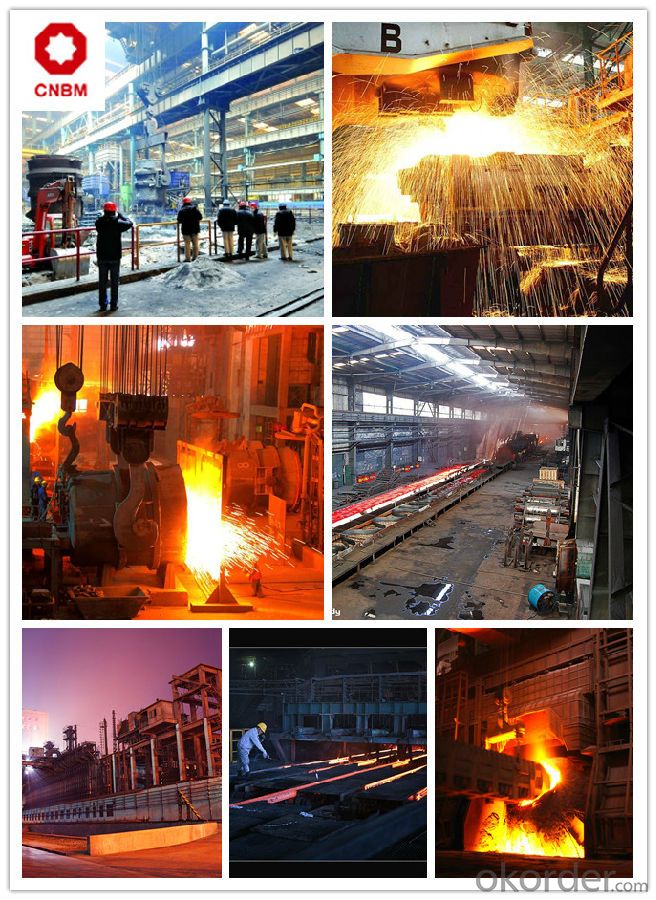
Company Information
CNBM International Corporation is the most important trading platform of CNBM group.
Whith its advantages, CNBM International are mainly concentrate on Cement, Glass, Iron and Steel, Ceramics industries and devotes herself for supplying high qulity series of refractories as well as technical consultancies and logistics solutions.

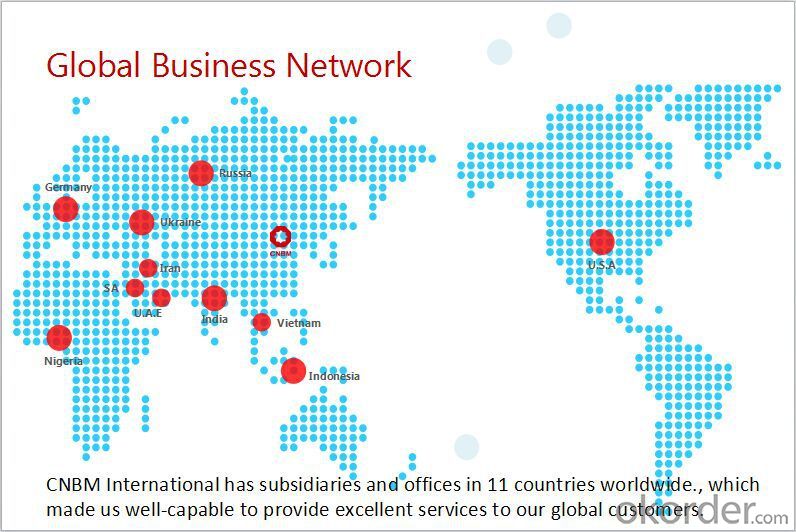
FAQ
1, Your advantages?
professional products inquiry, products knowledge train (for agents), smooth goods delivery, excellent customer solution proposale
2, Test & Certificate?
SGS test is available, customer inspection before shipping is welcome, third party inspection is no problem
3, Factory or Trading Company?
CNBM is a trading company but we have so many protocol factories and CNBM works as a trading department of these factories. Also CNBM is the holding company of many factories.
4, Payment Terms?
30% TT as deposit and 70% before delivery.
Irrevocable L/C at sight.
5, Trading Terms?
EXW, FOB, CIF, FFR, CNF
6, After-sale Service?
CNBM provides the services and support you need for every step of our cooperation. We're the business partner you can trust.
For any problem, please kindly contact us at any your convenient time.
We'll reply you in our first priority within 24 hours.
Packaging & Delivery
1, Packaging: seaworthy package or as required
2, Delivery: 35-45 days or based on quantity
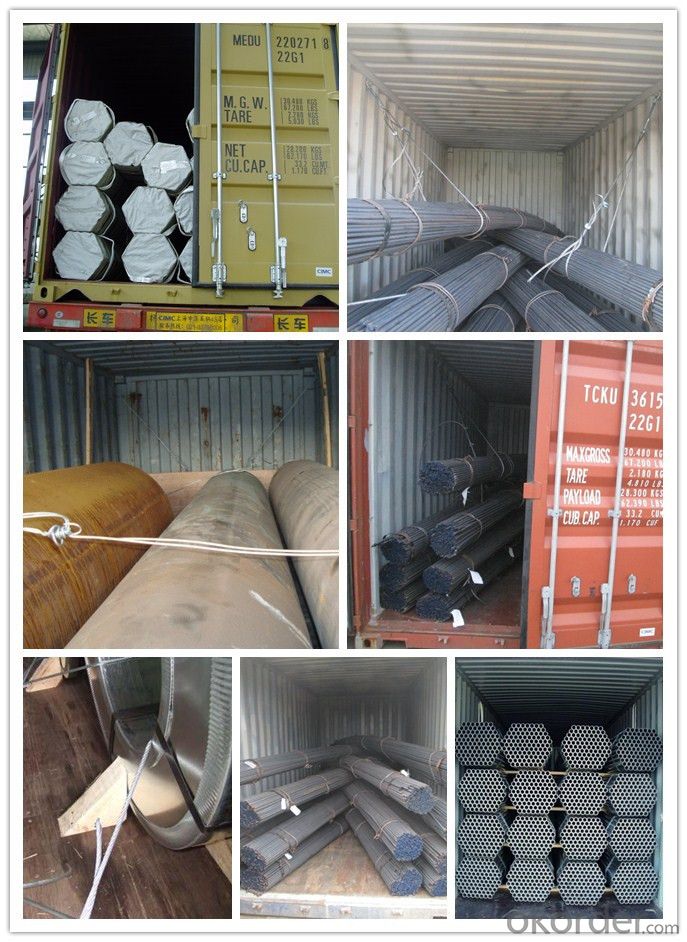
- Q: What is the difference between hot rolled and cold drawn steel round bars?
- Hot rolled steel round bars undergo the process of heating a steel billet or ingot at a high temperature and subsequently rolling it into the desired shape. This process yields a rougher surface finish and a greater diameter tolerance in comparison to cold drawn steel round bars. The usage of hot rolled bars is frequently found in areas where strength and durability hold significance, such as in construction and manufacturing. On the contrary, cold drawn steel round bars are created by pulling a hot rolled bar through a die at room temperature, leading to a smoother surface finish and tighter diameter tolerances. This procedure also enhances the mechanical properties of the steel, including its strength and hardness. Cold drawn bars are often employed in scenarios where precision and a high-quality surface finish are prerequisites, like in the production of shafts, bolts, and precision components. To summarize, the principal disparities between hot rolled and cold drawn steel round bars encompass the surface finish, diameter tolerance, and mechanical properties. Hot rolled bars bear a rougher surface finish, larger diameter tolerances, and are typically utilized in contexts where strength and durability are paramount. Cold drawn bars possess a smoother surface finish, tighter diameter tolerances, and are commonly employed in situations necessitating precision and a high-quality surface finish.
- Q: What is the difference between a centerless ground and a precision ground steel round bar?
- The main difference between a centerless ground and a precision ground steel round bar lies in the manufacturing process and the resulting quality of the finished product. A centerless ground steel round bar is manufactured using a machining technique called centerless grinding. In this process, the steel bar is placed between two grinding wheels, one rotating at a high speed and the other stationary. The rotating wheel removes material from the bar's surface, creating a smooth and evenly-sized round shape. Centerless grinding is known for its ability to produce bars with tight tolerances and excellent surface finish. On the other hand, a precision ground steel round bar is manufactured using a different process called precision grinding. In precision grinding, the steel bar is held in a chuck or fixture and rotated against a grinding wheel. The grinding wheel removes material from the bar's surface, creating a precise round shape with tight tolerances. Precision grinding is often used when a higher level of accuracy is required, such as in applications where the bar will be used as a critical component in machinery or tools. In summary, both centerless ground and precision ground steel round bars offer a high level of dimensional accuracy and surface finish. However, centerless grinding is a more efficient and cost-effective process for producing large quantities of round bars with consistent quality, while precision grinding is preferred for applications that require the highest level of dimensional accuracy and surface finish.
- Q: Are steel round bars suitable for the production of gears?
- Steel round bars are indeed appropriate for gear production. Because of its high strength, durability, and resistance to wear and tear, steel is commonly employed in gear manufacturing. The round bar shape facilitates the machining and shaping of gear teeth. Moreover, steel round bars offer exceptional hardness and toughness, guaranteeing the gears' ability to handle substantial loads and operate seamlessly. Furthermore, steel can be subjected to heat treatment to further augment its mechanical properties, rendering it an optimal selection for gear production.
- Q: Are steel round bars suitable for the production of fasteners?
- Fasteners can be produced using steel round bars, which are a suitable choice. Steel is known for its strength and durability, enabling it to withstand high levels of tension and pressure. This makes it an ideal option for fasteners. Round bars, specifically, offer a smooth and even surface that can be easily machined and shaped into various types of fasteners like bolts, screws, and studs. The versatility of steel round bars allows for customization in terms of size, length, and surface finish. As a result, they are suitable for a wide range of fastening applications in industries such as construction, automotive, and manufacturing. Moreover, steel round bars exhibit excellent corrosion resistance properties when coated with protective finishes. This ensures that the fasteners have a long lifespan and can be relied upon.
- Q: What are the different types of steel round bar surface finishes for corrosion resistance?
- Corrosion resistance in steel round bars can be achieved through various surface finishes. These finishes effectively shield the bar from corrosive elements, reducing the risk of rust or degradation over time. Hot-dip galvanizing is a popular choice for corrosion resistance. It entails immersing the steel round bar in molten zinc, which creates a protective zinc coating. This sacrificial anode corrodes before the steel, providing long-lasting protection against rust and corrosion. Stainless steel is another common surface finish for corrosion resistance. With a minimum chromium content of 10.5%, it forms a passive oxide layer when exposed to oxygen. This layer acts as a barrier, preventing further oxidation and corrosion, making stainless steel round bars highly resistant to rust. Electroplating is a method used to provide corrosion resistance. By immersing the bar in an electrolyte solution and passing an electric current through it, a layer of metal like zinc or nickel is deposited onto the surface, offering a protective coating. For steel round bars that require both corrosion resistance and aesthetic appeal, powder coating is a popular choice. This process involves applying a dry powder coating to the surface and curing it under heat. The resulting hard, durable finish not only offers excellent corrosion resistance but also provides a variety of color options. There are also specialized coatings available for specific applications, such as epoxy or polymer coatings. These coatings offer superior resistance to particular corrosive environments, like exposure to chemicals or high humidity. In conclusion, there are several types of surface finishes for corrosion resistance in steel round bars. These include hot-dip galvanizing, stainless steel, electroplating, powder coating, and specialized coatings. The choice of finish depends on factors such as the specific application, environmental conditions, and desired aesthetics.
- Q: What is the typical lead time for manufacturing steel round bars?
- The typical lead time for manufacturing steel round bars can vary depending on various factors such as the size and quantity of the bars, the complexity of the manufacturing process, and the production capacity of the manufacturer. In general, lead times for manufacturing steel round bars can range from a few days to several weeks. For standard sizes and quantities, the lead time is usually shorter as manufacturers often have these readily available in stock. However, for custom orders or larger quantities, the lead time may be longer as it involves additional processes such as sourcing raw materials, cutting, heat treating, and quality control checks. It is important to note that lead times can also be influenced by market demand and the manufacturer's production schedule. During periods of high demand or limited production capacity, lead times may be extended. Alternatively, if there is low demand or surplus production capacity, lead times can be shorter. To get an accurate estimate of the lead time for manufacturing steel round bars, it is recommended to contact specific manufacturers or suppliers directly. They will be able to provide more precise information based on their capabilities and current workload.
- Q: What is the maximum nitrogen content allowed for steel round bars?
- The maximum nitrogen content allowed for steel round bars varies depending on the specific steel grade and application requirements. However, in general, the nitrogen content is typically limited to around 0.025-0.035% to maintain the desired mechanical properties and avoid detrimental effects on the material's performance.
- Q: Are steel round bars resistant to corrosion?
- Yes, steel round bars can be resistant to corrosion depending on the type of steel and the environment they are exposed to. Stainless steel round bars, for example, contain chromium which forms a thin passive layer on the surface that protects against corrosion. This layer is self-repairing and provides excellent resistance to corrosion in many environments, including moisture, chemicals, and saltwater. However, carbon steel round bars are not inherently corrosion-resistant and may require additional protective coatings or treatments to prevent corrosion. Therefore, it is important to consider the specific type of steel and the intended application when determining the corrosion resistance of steel round bars.
- Q: Can steel round bars be used in the manufacturing of shafts?
- Yes, steel round bars can be used in the manufacturing of shafts. Steel round bars are often used as raw materials for shaft manufacturing due to their high strength, durability, and excellent mechanical properties. The round shape of the bar allows for easier machining and forming processes, making it suitable for creating shafts of various sizes and lengths. Additionally, steel round bars can be heat treated to enhance their hardness, strength, and wear resistance, further improving their suitability for shaft applications.
- Q: Are steel round bars resistant to chemicals or acids?
- Most chemicals and acids do not affect steel round bars, although the level of resistance varies depending on the specific steel type and the concentration and nature of the chemical or acid. Stainless steel round bars, on the other hand, have excellent resistance to corrosion and many types of acids. This makes them ideal for use in industries like chemical processing, food processing, and pharmaceuticals. However, it is worth noting that aggressive chemicals and acids, such as hydrochloric acid or sulfuric acid at high concentrations, can still cause corrosion or damage to steel round bars. In these instances, it is advisable to seek advice from experts or consult material compatibility charts to determine the most appropriate steel alloy for the intended application.
Send your message to us
35cd4 Alloy Structural Steel Round Bars
- Loading Port:
- China main port
- Payment Terms:
- TT OR LC
- Min Order Qty:
- 50 m.t.
- Supply Capability:
- 10000 m.t./month
OKorder Service Pledge
OKorder Financial Service
Similar products
Hot products
Hot Searches
Related keywords


